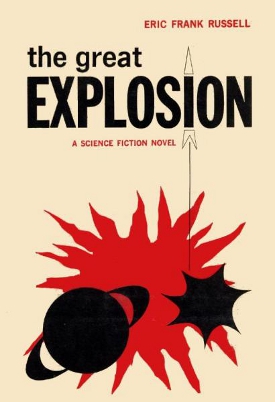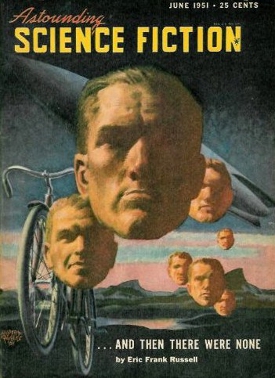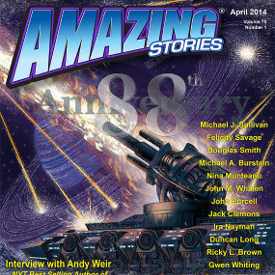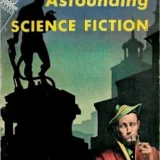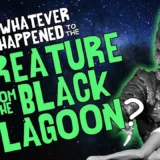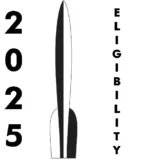It should be no surprise that non-genre writers want to play in the SF/F sandbox. After all, we have the best toys. Consider, for instance, what you can do with one standard issue diaspora outfitted with a long term isolation and rediscovery. Send forth the colonists, cut them off from the mother world for a few hundred or thousand years, and the potential outcomes provide a nearly unlimited supply of ‘What Ifs’ to explore human nature and societies. Among the many SF works that have utilized this scenario, (a long list that includes Anderson’s Technic History, Le Guin’s Hainish Cycle and Bujold’s Vorkosigan Saga), is one of my all-time favorites, Eric Frank Russell’s hilarious libertarian satire, The Great Explosion.
The story is set roughly six hundred years in the future, five hundred years after the Blieder drive makes faster-than-light travel possible, and four hundred years after the end of The Great Explosion – the diaspora of hundreds of dissident groups, each seeking elbow room and the freedom to set up society as they see fit. This wave of mass migrations left Earth with only half its former population and caused an economic collapse requiring a four century recovery.
Four hundred years after The Great Explosion, revived and ready to find out what happened to their brethren across the galaxy, the Terrans set out intent on empire – for the good of all, naturally. After all, who will protect the colonies should hostile aliens (as yet undiscovered) attack? Colossal ships are issued forth, complete with crews, troops, bureaucrats, and ambassadors with orders to acquire treaties and set up consulates on each of the planets. The reader follows the mission of the latest and most colossal ship yet, a mile and half long behemoth assigned to investigate four far flung planets that haven’t heard a peep from Earth in four hundred years.
First stop is a prison colony, not exactly freedom seeking dissidents, but they’ve formed their own version of an ideal society based on the law of “Finders Keepers.” A series of humorous encounters with the locals (which I will not spoil) leaves the Terrans confounded and unable to establish a consulate. Undeterred, they move on expecting better results at the next planet.
The second planet, Hygiea, with its lush countryside and quaint looking towns, appears to be idyllic – that is until they realize that the inhabitants don’t wear any clothes. Furthermore, the natives find the Terrans repulsive, smelly and physically unfit, and they make no attempt to conceal their disapproval. Imagine a nude Hans and Franz (of SNL fame) issuing a steady stream of condescension about your flabby out of shape body, and you’ll get the picture. Here too, the Terrans run into obstacles, primarily relating to the customs and laws of the nudists.
An aerial survey of the third planet reveals empty towns overgrown by jungle. The fate of the colonists is unknown, but the visit helps make clear (if the reader hasn’t already pickup up on it) that xenophobia and racism are inherent in the Terran presumption of cultural superiority.
The visit to the final planet constitutes about forty percent of the novel and was originally published as the novella “And Then There Were None” in Astounding in 1951. Here, the Terrans encounter an entirely different form of resistance from the locals as repeated attempts to discover the whereabouts of the civil authorities are stifled by the phrase “myob” (Russell was apparently the first to use this abbreviated form of Mind Your Own Business). Furthermore, Gands (what the inhabitants call themselves) inform some of the ship’s crew that they possess the mightiest of weapons. Mighty enough to defeat the Terrans, but completely ineffective if used against the Gands. In the interest of not spoiling the story, I will refrain from going into more detail. Suffice to say that the ensuing conflict is uproariously funny and likely to leave a lasting impression on the reader.
The novella itself is a recognized classic, appearing in Science Fiction Hall of Fame Volume II as well as numerous other anthologies. And while the novella is probably the funniest portion of the book, the novel is worth reading in its entirety.
In The Great Explosion, Russell fashioned a satire similar to Gulliver’s Travels. Like Gulliver, the ship visits four lands, each allowing the author to satirize different aspects of human nature, governments and political views. Russell’s conclusions are decidedly libertarian which is why twenty-three years after its publication, The Great Explosion was awarded the 1985 Prometheus Hall of Fame Award. This fact should not discourage readers of differing political persuasions. This book is comedy, not a heavy handed diatribe. I suspect that readers of nearly all political stripes will find something noble in the Gands. And who knows, you might even be calling yourself a Gand by the time you finish reading The Great Explosion.

